Hi, what do you want to do?
Technology Student
Technology Student: Gears and Pulleys
This site describes the basics of gears and pulleys, and their use in simple machines.
CK-12 Foundation
Ck 12: Physical Science: Pulley
[Free Registration/Login may be required to access all resource tools.] What a pulley is and the three basic types, and the mechanical advantage of a pulley.
Physics Aviary
Physics Aviary: Moment of Inertia of Pulley
This lab is designed to have students learn how the size, mass and mass distribution of a pulley influences the rate at which a mass attached to the pulley will accelerate. The pulley is frictionless and the string's mass is negligible.
Physics Aviary
Physics Aviary: Pulley Lab
This lab is designed to have students find the relationship between the number of pulleys used and the force required to lift a mass. Students will see that it is not actually the number of pulleys that matter, but the number of strings...
Other
New Path Learning: Virtual Lab: Exploring Pulleys
Investigate how changing the load, number of pulleys, and the size of the person affect the function of a pulley system. Students can record their observations on a data table.
Science Education Resource Center at Carleton College
Serc: Comparing Mechanical Advantage and Efficiency of Pulleys
Students determine the mechanical advantage of three pulley set-ups. Then they measure the work input and output to calculate the efficiency. Finally, students determine the relationship between the mechanical advantage and the...
Other
How to smile.org: Building Pulleys
An activity where students use pulley systems to pick up a paint can and move an eraser from the ground to the top of a desk. After completing this activity, students will understand how pulley systems can help us do work.
Integrated Publishing
Integrated Publishing: Pulley Mechanical Advantage
Good illustrations and explanations for finding the mechanical advantage of pulley systems.
Sophia Learning
Sophia: Practice W/ Ropes & Pulleys: Lesson 2
This lesson provides the learner with an example problem on determining the net force acting on objects within a rope and pulley system. It is 2 of 2 in the series titled "Practice w/ Ropes & Pulleys."
Sophia Learning
Sophia: Simple Machines: Pulley: Lesson 2
This lesson will explain how to calculate the mechanical advantage of a pulley system. It is 2 of 3 in the series titled "Simple Machines: Pulley."
Sophia Learning
Sophia: Simple Machines: Pulley: Lesson 3
This lesson will explain how to calculate the mechanical advantage of a pulley system. It is 3 of 3 in the series titled "Simple Machines: Pulley."
Scholastic
Scholastic: Dirtmeister's Science Reporters: Simple Machines: Pulley
With-it explanation of how the pulley works, where it's found. Most interesting, as Scholastic material usually is.
Other
Colts Neck Township Schools: Hands on Technology: Marvelous Machines: Pulleys 2
Student handout for conducting an experiment in using one pulley or two pulleys to lift a load.
Sophia Learning
Sophia: Forces in a Rope & Pulley System: Lesson 2
This lesson explains what forces are acting on objects which are at rest or moving in a rope and pulley system. It is 2 of 2 in the series titled "Forces in a Rope & Pulley System."
Sophia Learning
Sophia: Net Force in Rope & Pulley Systems: Lesson 2
This lesson demonstrates how to find the net force acting on objects in a rope and pulley system. It is 2 of 2 in the series titled "Net Force in Rope & Pulley Systems."
Sophia Learning
Sophia: Net Force in Rope & Pulley Systems: Lesson 1
This lesson demonstrates how to find the net force acting on objects in a rope and pulley system. It is 1 of 2 in the series titled "Net Force in Rope & Pulley Systems."
Sophia Learning
Sophia: Representing Forces in a Rope & Pulley System: Lesson 2
This lesson demonstrates how to draw a free-body diagram for a rope and pulley system. It is 2 of 2 in the series titled "Representing Forces in a Rope & Pulley System."
Concord Consortium
The Concord Consortium: Molecular Workbench: Weight Balance on a Pulley
Watch how the placement of two weights attached to a chain on different sides of a pulley affect the movement of the system. You can adjust the heaviness of the weights.
TeachEngineering
Teach Engineering: Simple Machines From Pyramids to Skyscrapers
Simple machines are devices with few or no moving parts that make work easier, and which people have used to provide mechanical advantage for thousands of years. Students learn about the wedge, wheel and axle, lever, inclined plane,...
TeachEngineering
Teach Engineering: The Power of Mechanical Advantage
Students learn about the mechanical advantage offered by pulleys in an interactive and game-like manner. By virtue of the activity's mechatronic presentation, they learn to study a mechanical system not as a static image, but rather as a...
TeachEngineering
Teach Engineering: Simple Machines
Through a five-lesson series with five hands-on activities, students are introduced to six simple machines - inclined plane, wedge, screw, lever, pulley, wheel-and-axle - as well as compound machines, which are combinations of two or...
Walter Fendt
Walter Fendt: Sistema De Poleas
This site is an interactive applet using the principles of a pulley system. The number of pulleys can be varied as well as the load lifted
Educaplus (Jesús Peñas Cano)
Educaplus: Dinamicas De Dos Masas Que Cuelgan De Una Polea [In Spanish]
This is a short demonstration to see the dynamics of two masses connected by a pulley.
Curated OER
Integrated Publishing/block & Tackle (Or Pulley)
Very substantial four-page article on how the block & tackle works. (It's a simple machine -- a pulley.) Lots of illustration. Mechanical advantage, formulae, solved problems, all here. Good source for info.
Other popular searches
- Science Project on Pulleys
- Pulleys and Gears
- Simple Machines Pulleys
- Pulleys and Levers
- Pulleys, Wheel and Axle
- Inclined Planes & Pulleys
- Levers and Pulleys Science
- Science Pulleys
- Physics Pulleys
- Science Forces and Pulleys
- Simple Machines / Pulleys
- Levers and Pulleys Project









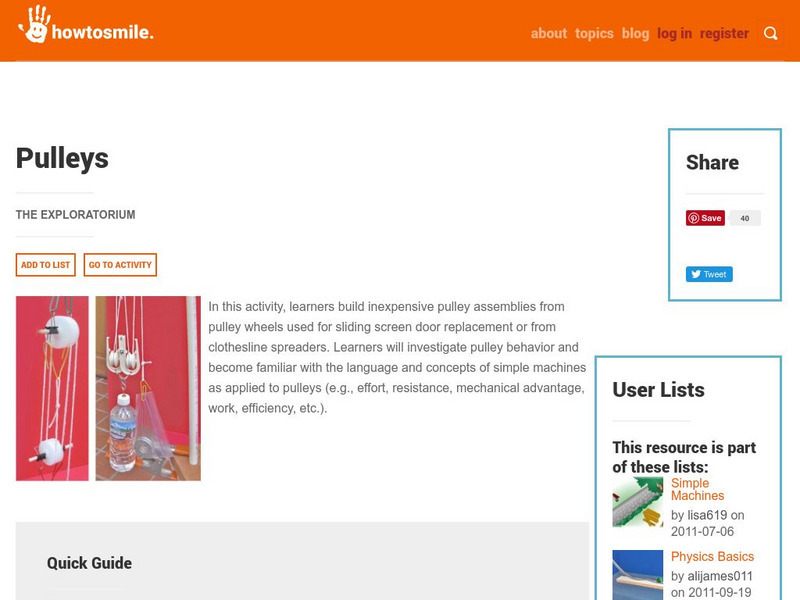







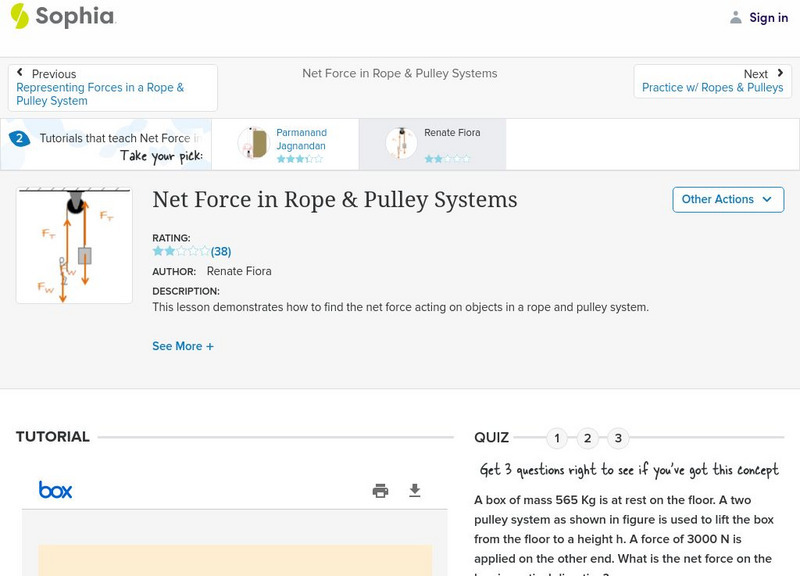

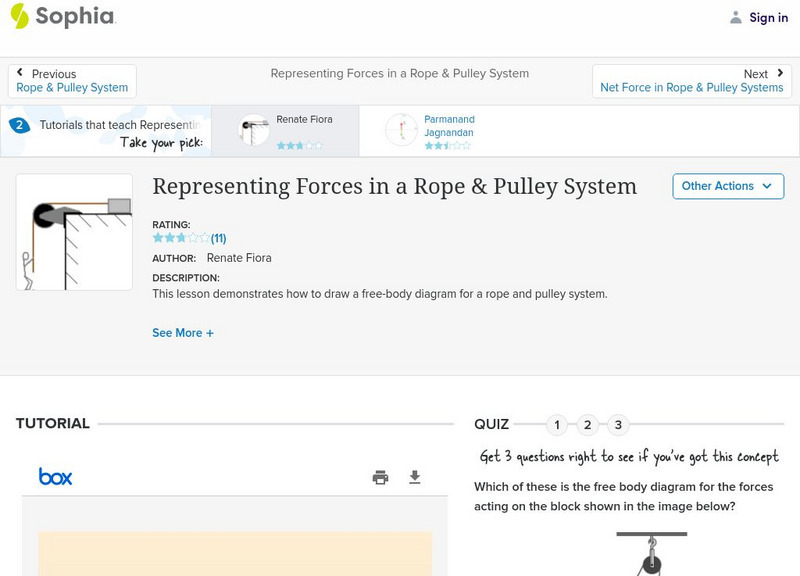


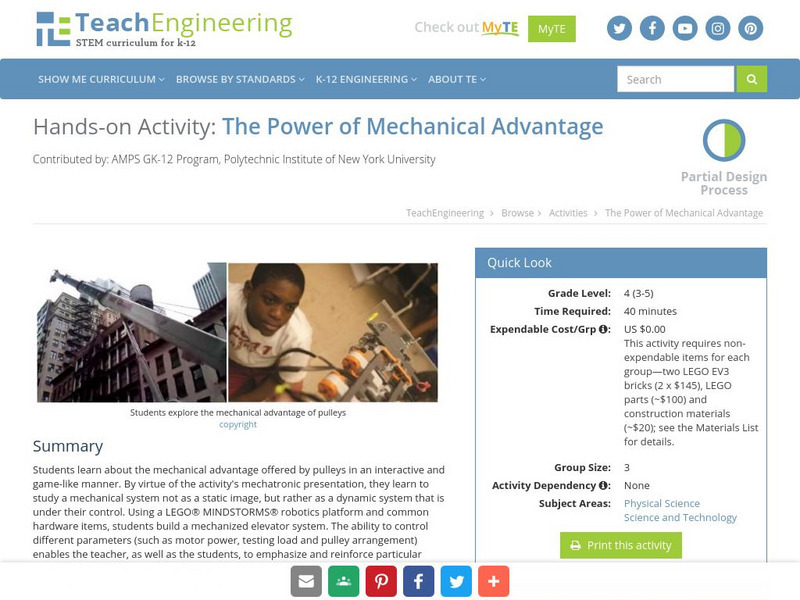
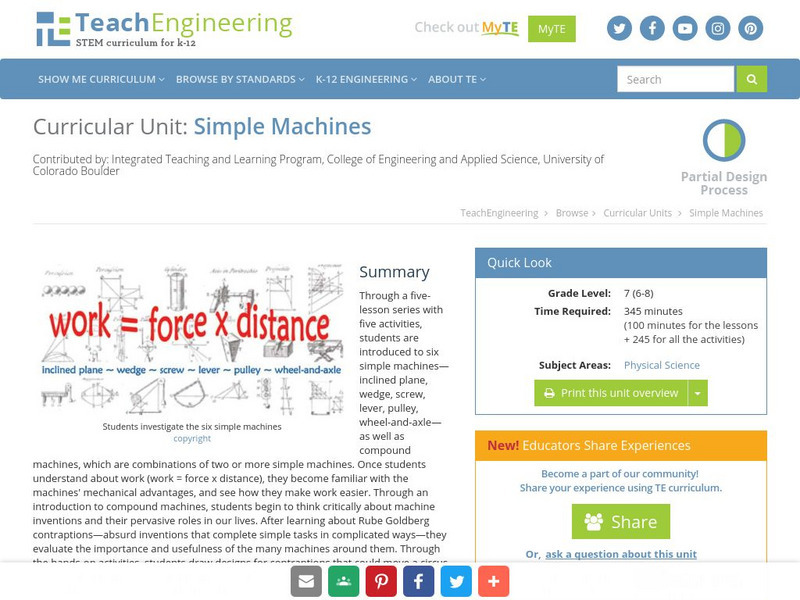

![Educaplus: Dinamicas De Dos Masas Que Cuelgan De Una Polea [In Spanish] Interactive Educaplus: Dinamicas De Dos Masas Que Cuelgan De Una Polea [In Spanish] Interactive](https://content.lessonplanet.com/knovation/original/408860-61c268f12e47634bb4f222f816b18bf7.jpg?1661771905)